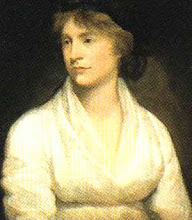28 October 2008
Response to Palmer’s The Promise of the Father: Chapter One (Rhetoric and Composition)
The Promise of the Father by Phoebe Palmer is an “argument in defense of women’s public ministry” (1089). She begins her argument by stating “Do not be startled…We do not intend to discuss the question of ‘Women’s Rights’ or of ‘Women’s Preaching,’” but, in a sense, that is exactly what she does; it is simply veiled by religious activity.
The text is full of the words: we, us, and our. Additionally, she poses some fifteen rhetorical questions and uses numerous enthymemes. Palmer is definitely making a connection. She is placing all women in the same situation that she faces as she attempts to promote God’s word. Yet she attempts to assure men that she does not aim to take their leadership roles; she is simply doing God’s will. Yet near the end of the text, she contradicts those statements.
Initially, she states, “But we have never conceived that it would be subservient to the happiness, usefulness, or dignity of woman, were she permitted to occupy a prominent part in legislative hall, or take a leading position in the orderings of church conventions. Ordinarily, these are not the circumstances where woman can best serve her generation according to the will of God” (1095).
But she asserts, “It is in the order of God that woman may occasionally be brought out of the ordinary sphere of action, and occupy in either church or state positions of high responsibility…The God of providence will enable her to meet the emergency with becoming dignity, wisdom, and womanly grace.”
Toward the middle of the text, she assures men that Adam was before Eve, and men were in a superior position and are the “first in creation, long as time endures.”
However, in the end she states, “Not only will the women of this age have to do with the women of the future age, but, as the men of the future age will have had their early training mostly from the women of the present age, how greatly have women to do with the destines of the moral and religious world!” (1099).
In order to back her claim, she proceeds to give biblical examples of where women served in Christian leadership roles. She mentions Deborah, a judge of Israel who was instrumental in leading a fierce, but victorious battle. Palmer states, “She led forth the armies of God to glorious conquest…not because there were not men in Israel [but because of her faith and wisdom.]”
She asserts that Huldah, the prophetess who proclaimed Jesus as the Messiah, was sought out for council by the king because she possessed the “momentous trust, involving the destinies of her country” (1096). She goes on to mention Queen Victoria and Mary as well.
After backing her claims with “modern and ancient” examples, she goes on to address to origin of the conflict on whether or not women should minster the word of God. But first she addresses the naysayers. She reminds her audience that no one ever questioned whether or not the women mentioned above could lead; instead, “we only speak of their being pious, earnest, [and] Christian wom[en].”
Then she poses the question, “Whose head the tongue of fire has descended” and who would have Christian women silenced? She states, “It is the power of an ever-present Jesus that the Spirit would have her testify; but the seal of silence has been placed on her lips. And who has placed the seal of silence on those Heaven-touched lips? Who would restrain the lips of those whom God has endued with the gift of utterance...?”
She addresses the origin of the conflict. She dissects Paul’s letter as it related to the women of Corinth. She argues that Paul’s instructions where specific for that particular church, not all women in all churches. In essence, she effectively used rhetoric to argue a point in a logical and methodical way. She gradually elevated the tension within the text through words, rhetorical questions, and stories. She systematically took apart the argument that women should not minister God’s word.
In the last paragraph, the text climaxes, she names her accusers. She states, “We feel that there is a wrong…which has long been depressing the hearts of the most devotedly pious women. And this wrong is inflicted by pious men [who] imagine that they are doing God service in putting a seal upon lips which God has commanded to speak…But…as we believe ignorance they have done it. Now ignorance will involve guilt” (1099). Palmer’s argument is a call to action for both women and men.
Subscribe to:
Post Comments (Atom)









No comments:
Post a Comment